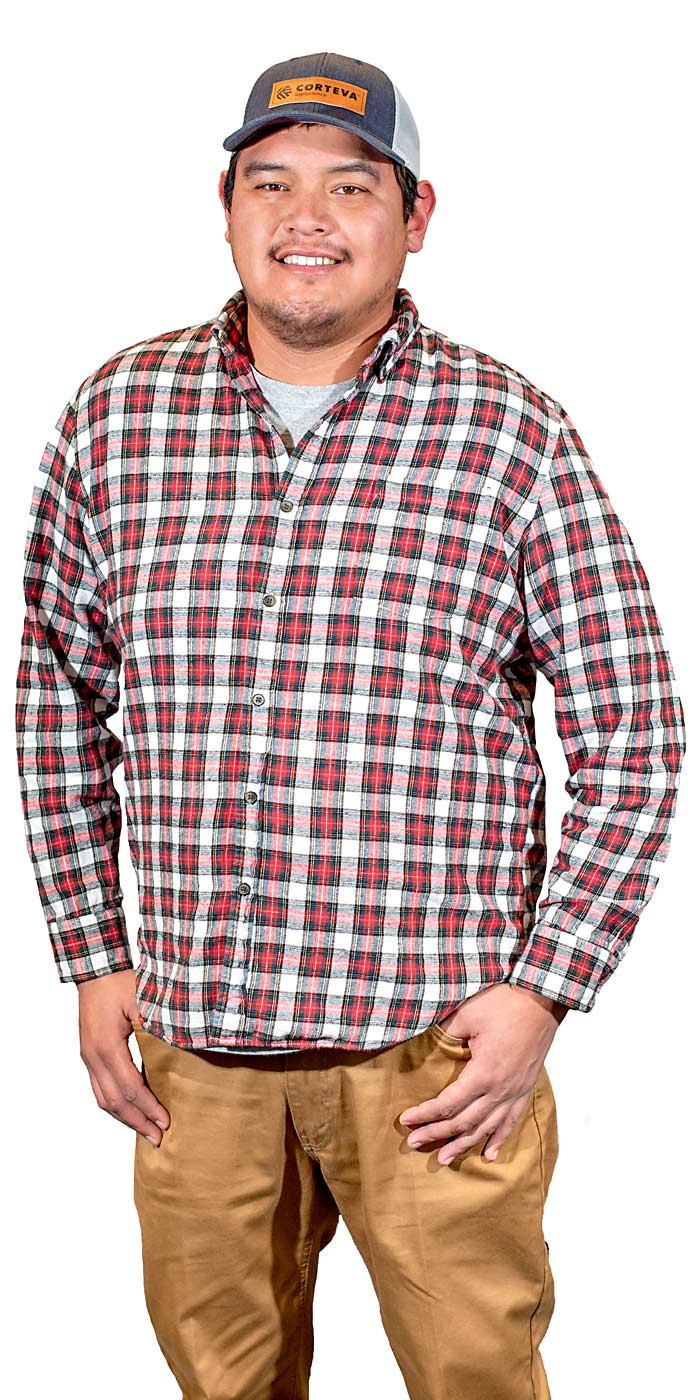family background/ Juan earned his bachelor’s degree in soil science from Oregon State University and is currently pursuing his graduate degree in horticulture. Juan is the son of Maria and Serafin Munguia.
age/29
grower/Mattawa, Washington
crops/Cherries, apples — research assistant
business/Washington State University Extension
How did you get your start?
Every summer, I’d be in the orchard with my cousins working cherry harvest, training and thinning trees, summer pruning, harvesting apples and driving tractors … My parents helped us — anything for school they’d supply — but if it wasn’t something you needed, like electronics or new clothes, then we were told to go work for it. Doing that work at a young age taught me to be responsible in my work.
My dad and uncle were orchard supervisors and they expected more from us kids.
I think it’s typical that when someone’s kids are working on the farm, they may get the easy jobs, but our parents were like, “Nope, we can’t let you slack off. If you slack off, then everyone slacks off.”
Working alongside them made me a hard worker and taught me to appreciate my jobs.
What did you pursue in college?
When I started at Columbia Basin College, I really didn’t have any plans for the future. One day, my dad’s boss recommended I take an agriculture class with one of my final electives: a beginning soil science class. I really enjoyed it and felt that everything was clicking and easy.
From that moment on, I enrolled in the horticulture program at CBC and once I was finished, I didn’t want to settle for a regular job. Because of that, I started looking at my options for my bachelor’s and decided to go to Oregon State University with some of my friends from CBC.
Were there any valuable surprises in your coursework?
I wanted leadership positions that focused on horticulture and how the plants grow and improve quality and yield.
Part of the degree ended up focusing on business management, which I didn’t expect. We learned how to sell products, how to lead teams and took lessons from several CEOs, which helped me get to where I am now.
As part of the extension program, I must speak directly to growers, passing on information. Those classes helped give me the confidence to go out and talk to these business leaders, which isn’t something I would have learned in my small town.
Why pursue a research program?
I sought out something completely different from my college friends. They seemed to be chasing money, looking for jobs that paid them well with good benefits, but I wanted a job that would help me out in the long term. I feel like being a fieldman is a short-term type of job.
I wanted to be both in the field and in the laboratory. Part of my degree at OSU required that I work in a professional internship, and that’s why I started to look at different areas within the tree fruit industry.
I reached out to the tree fruit research groups around Washington and, after a while, I was contacted by WSU Extension about a research assistant job in Prosser. Doing that, I was able to get an internship for my degree at OSU and was offered a full-time position after I graduated.
What is it like working in tree fruit research?
It’s completely different than working as a grower. Many things we work on are new to me, but I know the goals of those studies will benefit growers, whether it’s improving quality or helping them deal with orchard issues.
Some of the differences between working in the field to research: When I was working in the orchard, I really didn’t pay attention to what’s going on with the whole orchard. Doing tasks, like going and tying branches, or pruning or picking, you really don’t need to know why. On the research side for instance, I get to understand why we’re picking fruit at different stages, at different colors, all to extend their storage life and improve profits.
The work is a lot of data collection and I had to prepare for that. There are moments where I’m measuring branches all day to learn more about different tree applications. If you’re applying growth regulators, they affect the growth of the tree. Doing this kind of work requires a lot of patience to make accurate calculations over time.
What would you tell younger growers about your path?
I wanted a job where I could help other people. I wanted to be able to provide information that helps reduce disorders.
Growing up, I wasn’t exposed to research about how things work in the field. Now that I’m involved with research, I can make the necessary connections to improve an orchard’s yield or pest management.
—TJ Mullinax







Leave A Comment